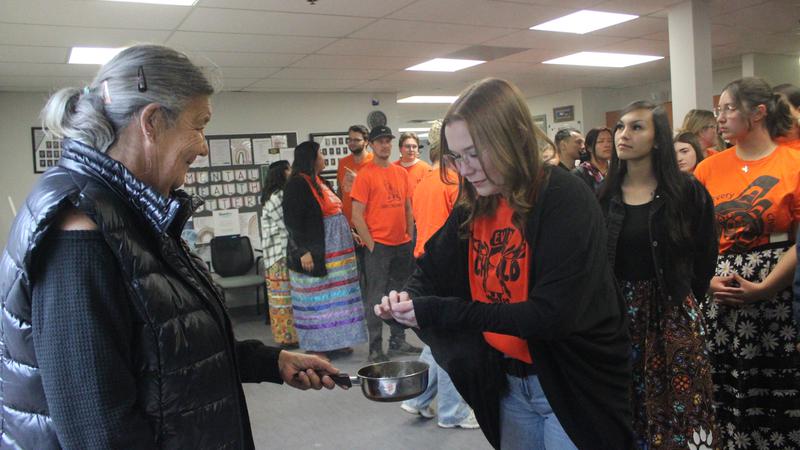Education
SUNTEP and FNUC Students Embrace Education as Path to Reconciliation

Students from the Saskatchewan Urban Native Teacher Education Program (SUNTEP) and the First Nations University of Canada (FNUC) participated in events aimed at fostering understanding and dialogue about reconciliation in education. The gatherings took place just days before the National Day for Truth and Reconciliation (NDTR) on September 30, a day officially recognized in Canada since June 3, 2021.
Andrew Poulin, a third-year student at SUNTEP in Prince Albert, expressed his commitment to being an educator who promotes truth and reconciliation in the classroom. He noted that while some progress is evident, there is always more to be done. “I think in the community right now, it is already somewhat being shown in schools, but there can be always so much more,” Poulin stated. He emphasized the program’s effectiveness in preparing future teachers for their roles, saying, “It’s an honor to do that, I think it takes a lot of that weight off our shoulders.”
At FNUC, students engaged with guest speakers covering a variety of topics, including justice and the role of education in reconciliation. Trina Joseph, Executive Director of FNUC, highlighted the significance of September 30 for honoring residential school survivors. In her opening remarks, she encouraged students to reflect on what reconciliation means to them personally, stating, “This is part of our history and share that this is part of our history.”
Joseph shared a personal story about her father, a residential school survivor, who initially struggled with the idea of the public commemorating the day. She reflected on his journey from skepticism to understanding, aided by her mother’s encouragement to share their family’s history. “We want to share a truth. This is our history. Our kids are here for a reason because we survived it. You know, it’s about resilience,” she said.
Elder Suzy Bear, from the Muskoday First Nation, also contributed her insights during the events. Having worked at the FNUC library for 13 years, she noted the slow pace of the federal government’s commitments to create awareness and facilitate reconciliation. “I wish it would speed up a bit… because some of our people really need that help,” she remarked, highlighting funding challenges that impact educational support programs.
Bear cited the example of Jordan’s Principle, which provides services to Indigenous children, pointing out recent grant cutbacks that hinder educational assistance. “You know, it paid for education assistance and extra help for our children that need extra help in class.” She stressed the importance of education, saying, “To me, education is so important. That’s how we’re going to move forward. That’s our new buffalo.”
Reflecting on her family’s legacy, Bear recounted how her mother was forced to leave school at Grade 8 to support the family. Despite this, her mother instilled the value of education in her children. “All of us in our family, the girls especially, we all have one or two degrees; one has a PhD… my brothers all have journeyman tickets,” she shared.
As the National Day for Truth and Reconciliation approaches, events are scheduled across Saskatchewan. On September 30, Pattison Media radio stations will participate in “A Day to Listen,” which aims to harness the power of radio to foster meaningful discussions and promote a more equitable future. Listeners are encouraged to tune in from 06:00 to 18:00 to hear interviews with Indigenous leaders, Knowledge Keepers, and other experts discussing the journey towards reconciliation.
The conversations at SUNTEP and FNUC reflect a growing recognition of the importance of education in the reconciliation process, underscoring the role of future educators in shaping a more inclusive society.
-

 Education3 months ago
Education3 months agoBrandon University’s Failed $5 Million Project Sparks Oversight Review
-

 Science4 months ago
Science4 months agoMicrosoft Confirms U.S. Law Overrules Canadian Data Sovereignty
-

 Lifestyle3 months ago
Lifestyle3 months agoWinnipeg Celebrates Culinary Creativity During Le Burger Week 2025
-

 Health4 months ago
Health4 months agoMontreal’s Groupe Marcelle Leads Canadian Cosmetic Industry Growth
-

 Science4 months ago
Science4 months agoTech Innovator Amandipp Singh Transforms Hiring for Disabled
-

 Technology4 months ago
Technology4 months agoDragon Ball: Sparking! Zero Launching on Switch and Switch 2 This November
-

 Education4 months ago
Education4 months agoRed River College Launches New Programs to Address Industry Needs
-

 Technology4 months ago
Technology4 months agoGoogle Pixel 10 Pro Fold Specs Unveiled Ahead of Launch
-

 Business3 months ago
Business3 months agoRocket Lab Reports Strong Q2 2025 Revenue Growth and Future Plans
-

 Technology2 months ago
Technology2 months agoDiscord Faces Serious Security Breach Affecting Millions
-

 Education4 months ago
Education4 months agoAlberta Teachers’ Strike: Potential Impacts on Students and Families
-

 Education3 months ago
Education3 months agoNew SĆIȺNEW̱ SṮEȽIṮḴEȽ Elementary Opens in Langford for 2025/2026 Year
-

 Science4 months ago
Science4 months agoChina’s Wukong Spacesuit Sets New Standard for AI in Space
-

 Business4 months ago
Business4 months agoBNA Brewing to Open New Bowling Alley in Downtown Penticton
-

 Business4 months ago
Business4 months agoNew Estimates Reveal ChatGPT-5 Energy Use Could Soar
-

 Technology4 months ago
Technology4 months agoWorld of Warcraft Players Buzz Over 19-Quest Bee Challenge
-

 Business4 months ago
Business4 months agoDawson City Residents Rally Around Buy Canadian Movement
-

 Technology4 months ago
Technology4 months agoFuture Entertainment Launches DDoD with Gameplay Trailer Showcase
-

 Technology2 months ago
Technology2 months agoHuawei MatePad 12X Redefines Tablet Experience for Professionals
-

 Top Stories3 months ago
Top Stories3 months agoBlue Jays Shift José Berríos to Bullpen Ahead of Playoffs
-

 Technology4 months ago
Technology4 months agoGlobal Launch of Ragnarok M: Classic Set for September 3, 2025
-

 Technology4 months ago
Technology4 months agoInnovative 140W GaN Travel Adapter Combines Power and Convenience
-

 Science4 months ago
Science4 months agoXi Labs Innovates with New AI Operating System Set for 2025 Launch
-

 Technology4 months ago
Technology4 months agoNew IDR01 Smart Ring Offers Advanced Sports Tracking for $169










